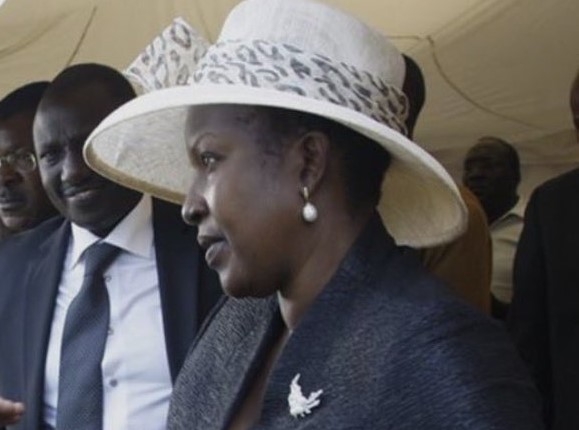Which between promiscuity and monogamy is a true reflection of human nature? Considering the numerous cases of people, both men and women, with multiple partners, is it time to reconsider the concept of marital fidelity?
For sure, marriage is much more than a sexual partnership. Marriage has spiritual, cultural and legal consequences on the couple. It is often said that marriage is not just about the coming together of a couple; it also marks a union between two families, which could be from different ethnic groups or races.
As marriage involves so much more than romance, would it be possible for individuals to engage in sexual relations with other people, while remaining loyal to the officially recognised marriage partner? The concept of having intimate multiple intimate relations with the consent of everyone involved is known as "polyamory".
The question of marital fidelity is once again in the news after a politician's husband was killed and his body dumped in a forest. Soon after the body was discovered, the Directorate of Criminal Investigations announced that the politician was the main suspect in the case. It seems the man had an extramarital affair with a woman, whom he was introducing to friends as his second wife.
The case provoked heated discussions on social media regarding the relevance of monogamy in the face of blatant infidelity. While some argued that marital infidelity is wrong on religious grounds, others said traditional African culture allowed polygamy because it is human nature for people to stray from the marital bed.
If you as a generous man decide to add a well from where you'll be quenching your thirst, just get to know that the aftermath of your actions may be suicidal
MONOGAMY VERSUS CULTURE
Edmond Makau, a lawyer, commented that the European concept of marriage is at odds with African tradition. "The Western teachings of shunning polygamy are creating unnecessary trauma, depression and heartaches for us all," he said.
Ng'endo Murugu, a commentator on social matters, said there's a difference between polygamy and cheating. "Polygamy is when you have more than one known wife. Cheating is when you have your known wife while there's another woman you don't want anybody else to know about," she said.
Mbita MP Millicent Odhiambo, a well-known advocate for women's rights, turned the debate around. Responding to men's arguments that Biblical personalities such as King Solomon were polygamous, Mabona said the woman who met Jesus Christ at Jacob's well had seven husbands. "Zero graze, please," she urged men.
Media columnist Edgar Wabwire believes that, whether it's through cheating or polygamy, having multiple sexual partners is bound to cause problems. "There is a reason why God created Eve, not Eve and a co-wife," he says.
"If you as a generous man decide to add a well from where you'll be quenching your thirst, just get to know that the aftermath of your actions may be suicidal," Wabwire warns.
Indeed, disagreements arising from multiple partners continue to produce tragic outcomes. On October 10, a man was arrested in Kakamega for the death of his wife in a row over his intent to marry a second wife. Neighbours told police the deceased insisted the man needed her permission as the first wife before bringing in additional wives.
CAUSE OF VIOLENCE, DIVORCE
Marital infidelity is often cited as the main cause of violence among couples. Infidelity is among the top three causes of divorce. Suicides have been reported, too, as happened in August 2021, when a 31-year-old woman in Kitengela took her life and that of her two-year-old daughter after suspecting her husband of infidelity.
Contrary to popular belief that only men engage in extramarital affairs, research shows there's no significant difference in marital infidelity between genders. A report published by the National Library for Medicine in 2013 reveals that 25 per cent of married men and 20 per cent of married women will engage in an extramarital affair during their marriages.
Fortunately, millions of couples handle marital infidelity away from the public limelight by separating, forgiving each other or agreeing to cohabit for the sake of their public reputation. Some spouses may tolerate unfaithfulness if financially dependent on the guilty person. Regardless of the outcome of marital infidelity, persons whose spouses cheated on them describe a deep feeling of betrayal.
"Infidelity makes you feel you are not good enough. Your self-esteem plummets from reasonably high, or just okay, to close to zero. Your beloved found someone who was better and more attractive than you in his or her eyes," writes US-based author Prof Berit Brogaard in Psychology Today magazine.
Staying loyal to one partner is the basis of monogamy, that a man and woman join together in holy matrimony for the rest of their lives. As we have seen, monogamy is under immense pressure. There's a clash between Christianity and traditional African culture, where polygamy by men was encouraged. Polyandry, the marriage of a woman to multiple husbands at the same time, was not practised in any Kenyan community.
Is it time for the world to embrace another concept in sexual relations? Can polyamory resolve the contradictions that are so obvious in modern society?
The Social Dictionary describes polyamory as any condition or practice that involves romantic or sexual relationships with multiple consenting partners. Both the man and woman in a couple are aware of the spouse's other lovers. The key word is 'consenting', that neither of the spouses has been forced into the arrangement.
Polyamory is not merely about dating anyone you wish at anytime you want. There are rules to be followed, such as alerting one's existing partners about new 'acquisitions', being honest about who you are with and recognising that all your partners have the same rights to spend time elsewhere as you do.
POLYFIDELITY
Various types of consenting agreements exist in polyamorous relationships. An individual may have a primary partner (the person the individual spends the most time with) and secondary partners. Polyamorous relationships may take the form of three-person or four-person relationships, where the partners date each other but do not engage in relationships with anyone outside the group (polyfidelity). This is meant to protect the group from sexually transmitted infections, such as HIV.
As Manchester Metropolitan University's Dr Christian Klesse explains, polyamory requires lots of hard work that goes beyond simple pleasure seeking. Polyamorous relationships demand constant negotiation among the partners. People in such relationships must be capable of managing feelings of jealousy.
"Polyamory fully believes in the ethical foundations that love equals work," Klesse says. "The partners in polyamorous relationships make efforts to stay together as proof of dedication to their partners."
Obviously, polyamory is at odds with religious teachings. However, if you are a married person with another intimate partner that your spouse knows about, then you are a polyamorist.











